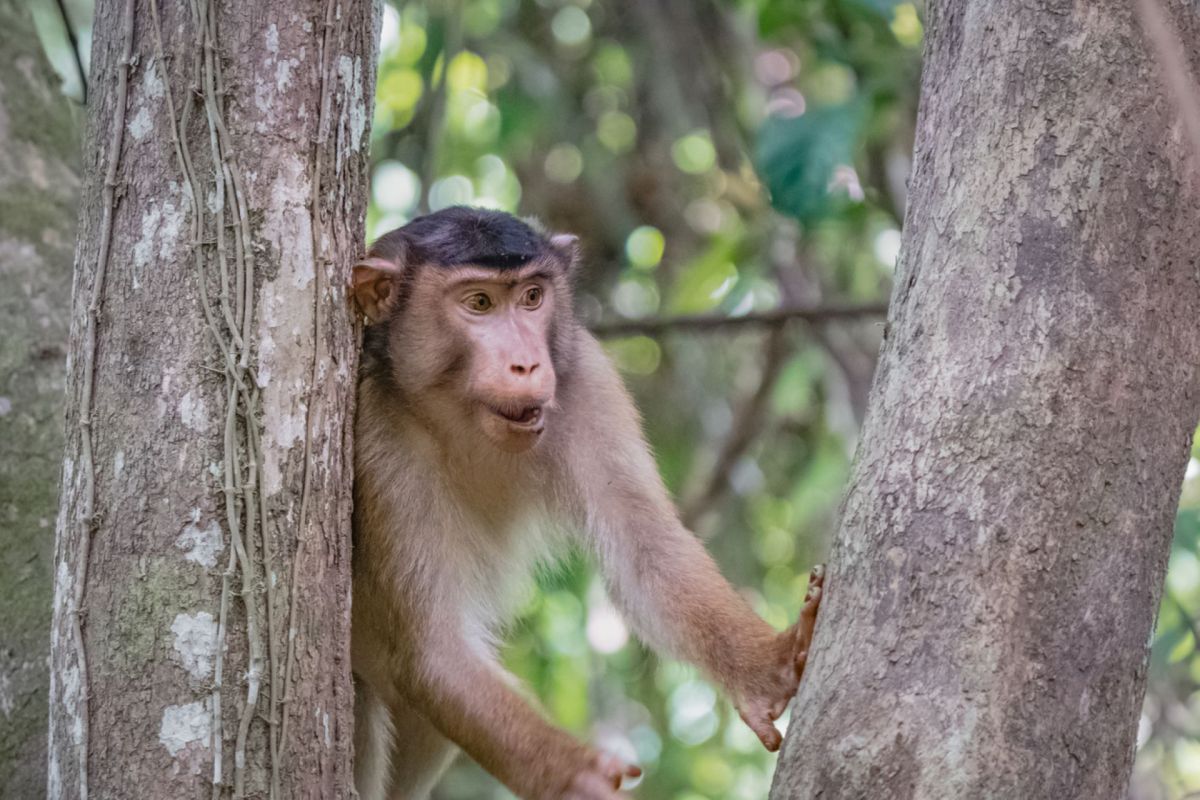After studying a group of southern pig-tailed macaques in Peninsular Malaysia for 12 years, a primatologist and her colleagues found a concerning statistic: 57% of all infants born between 2014 and 2023 died before turning one.
They believe prolonged exposure to pesticides and herbicides in oil palm plantations may explain the shockingly high mortality rate, as Mongabay reported recently.
What's happening?
Researchers followed two groups of macaques through native rainforests and nearby oil palm plantations, closely watching their behavior to understand how they adapted to agricultural plantations in their habitat, per Mongabay.
They found that when infant macaques spent over three hours per day in the oil palm plantation, their risk of death tripled. Nadine Ruppert, a primatologist and co-author of the study, told Mongabay that in some years, no babies survived.
While macaques are native to the tropical rainforests of Southeast Asia, they've adapted to living in agricultural areas such as oil palm monocultures, according to the New England Primate Conservancy.
Though monocropped farms can provide an easy food source for the primates, there are also many hidden dangers lurking in the dense plantations. Macaques who frequently visit them have greater exposure to harmful agricultural chemicals and higher risks of being killed or attacked by predators, plantation workers, or wildlife traffickers.
Get convenient, affordable therapy right from your phone — plus, a week of free counseling This Mental Health Awareness Month, break the barrier with BetterHelp, the world's largest therapy service, with accessible, affordable counseling from licensed, board-accredited therapists you can trust. And it’s 100% online. Get the help you deserve anytime, anywhere, through any device — computer, tablet, or smartphone. In fact, 69% of BetterHelp members reported improved anxiety symptoms after six weeks of therapy. Plus, for a limited time, get your first week of counseling for free. Learn more → |
Anna Holzner, a co-author of the study, and a researcher from the Max Planck Institute for Evolutionary Anthropology in Germany, told Mongabay that the research team recorded a 50% population decline in one of the primate groups over 10 years, which she said is a troubling sign for their long-term survival.
"The importance of this study is that it is looking at the next generation," conservationist Felicity Oram, director of the Malaysian NGO Orang Juga, told Mongabay. "We need more studies like this because there's not a lot of studies about macaques, especially in natural environments."
Why is infant macaques' high mortality rate concerning?
Based on a 2022 assessment by the International Union for Conservation of Nature, Southern pig-tailed macaques are classified as endangered. According to the organization, the species' population has declined by 50% over the past 33 years and will likely continue to drop if agricultural practices don't change, as the New England Primate Conservancy summarized.
The potential loss of an entire species is concerning, especially since macaques likely play an essential ecological role. The conservancy said that macaques help disperse seeds from the fruits and plants they eat. They also eat unwanted pests like rats, per Mongabay, which could provide a free pest control service for plantation owners.
TCD Picks » Grove Collaborative

"Their protection will ultimately contribute to maintaining biodiversity and important ecosystem functions of tropical habitats," said Ruppert in a news release on another scientific paper about macaques.
What's being done about it?
As Mongabay explained, researchers urge agribusiness companies to embrace environmentally friendly practices that don't harm wildlife, such as removing weeds by hand instead of using herbicides. They also advised plantation managers to create forest corridors to help boost the gene pool and protect future generations.
Individually, we can support companies that use sustainably sourced palm oil to ensure macaques and other wildlife aren't harmed by the products we buy.
Join our free newsletter for cool news and cool tips that make it easy to help yourself while helping the planet.

















